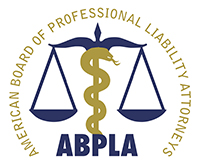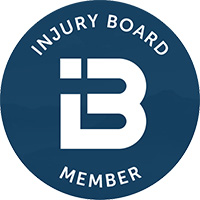Serious Injury Attorneys Serving Rhode Island
Few events are more devastating than losing an arm, leg, or another part of your body. Even the loss of a finger or toe can impact your ability to perform your job duties or walk without difficulty. Amputations can also affect more than your body. Many amputees struggle with anxiety, depression, and self-esteem.
No one deserves to have their life permanently changed because of someone else’s negligence. If you have lost a limb or other body part because of someone’s careless or reckless behavior, you may be entitled to compensation for your physical, emotional, and financial losses.
The experienced amputation injury attorneys at Mandell, Boisclair & Mandell, Ltd have been helping injury victims in Providence and other areas of Rhode Island for 45 years. We understand the difficulties you may be facing during this time, and we are committed to helping you seek the justice and compensation you deserve.
What Is Traumatic Amputation?
Amputations involve the surgical or traumatic separation of a body part from the body. Traumatic amputations are caused by accidental events that result in the loss of a body part. Traumatic amputations can involve any part of the body, including the legs or arms. Traumatic amputations can occur for a number of reasons. In some cases, limbs may be lost at the moment of impact in an event such as a traffic wreck. In other cases, a limb may be damaged beyond repair due to a tear, severe burn, or crushing accident.
Amputations are generally classified as either “complete” or “incomplete.”
- Complete amputations: This refers to amputations in which the body part is totally severed from the body.
- Incomplete, or partial amputation: This occurs when some muscle, ligament, or tendon remains intact between the body and the amputated anatomy. While the body part may not be functional and complete amputation may be imminent, the body part remains connected to the body. In these situations, every effort should be made to preserve this connection.
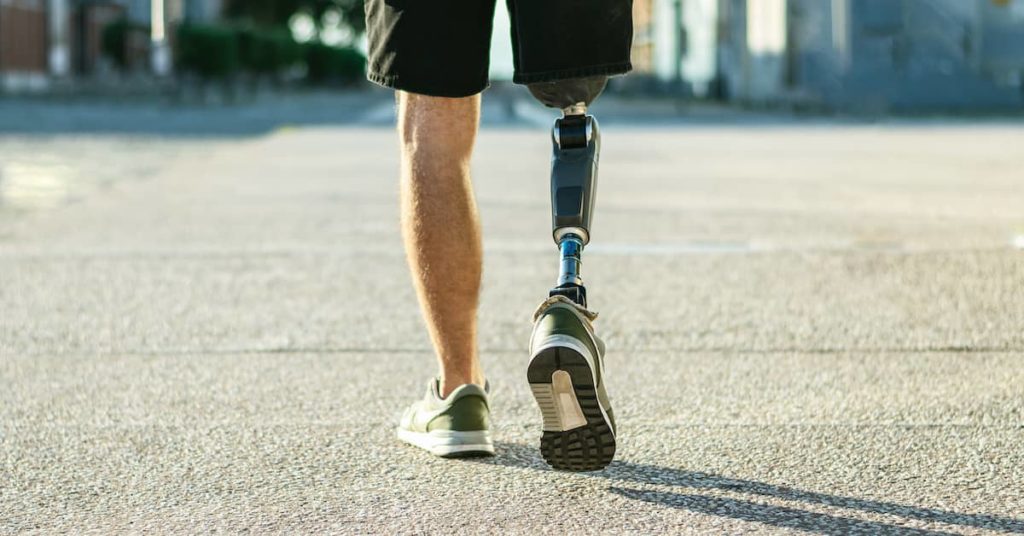
Common Types of Traumatic Amputation
Traumatic amputations tend to involve specific types of amputation, also referred to as mechanisms of injury (MOI). The most common mechanisms of injury in traumatic amputations are:
- Crush injury: These tend to be the most common type of traumatic amputation, resulting in severe tissue damage and serious injury. Because of the destructive nature of crush injuries, it is often less likely that the severed body part will be successfully reattached.
- Guillotine injury: These types of amputations involve sharp edges. The body parts that are severed by guillotine forces are generally more likely to have positive reattachment and recovery outcomes.
- Avulsion injury: From the Latin “avellere,” meaning “to tear off,” these traumatic amputations involve injuries in which a body structure is torn off. These injuries tend to have the poorest reattachment outcomes.
What Can Cause an Amputation?
The accidents that most commonly result in the loss of extremities, digits, or limbs tend to be severe. Examples include:
- Car accidents can cause pinning, crushing, burning, severing, degloving, and broken bones that do not heal.
- Truck accidents can result in more catastrophic injuries than collisions involving passenger vehicles due to their sheer size and weight.
- Motorcycle accidents frequently lead to severe injuries, including amputations, as these crashes can throw riders with enough force to sever limbs on sharp objects or shatter limbs beyond repair.
- Construction site accidents caused by falls from heights, electrocutions, or being struck by or caught between objects can cause pinning, crushing, and burn injuries that may result in amputations.
- Defective products such as faulty car parts, gas grills, appliances, or other products that malfunction or explode can cause amputations.
- Severe burns resulting from chemicals, electrocutions, or fires can lead to irreparable damage that could lead to amputation.
Amputation Recovery and Care
Recovering from traumatic amputation can be extensive, expensive, and incredibly challenging. Treatment can involve reconstruction or the use of prosthetics. Following a traumatic amputation injury, patients are likely to:
- Be hospitalized
- Receive acute care for the loss of a body part
- Undergo inpatient rehabilitation
- Attend outpatient doctor visits
- Receive physical and occupational therapy
- Receive social and psychological therapy or support
- Purchase a prosthetic device
Potential Complications From an Amputation Injury
In addition to the initial injury, a number of associated health complications can potentially affect victims of traumatic amputation injuries. For example, patients may experience complications during surgery, or suffer skin problems from wearing a prosthetic. Some patients experience phantom pain – the sensation of feeling pain in the extremity or limb that was severed.
Life After Amputation
Many amputees struggle with numerous physical, emotional, and social adjustments that can take years to successfully manage. Professional services, such as medical treatment, counseling, physical and occupational therapy, and basic rehabilitation education are often required to help amputees move forward.
Some of the most common struggles experienced by amputees include:
- Learning to use arm or leg prostheses
- Relearning basic tasks such as walking, dressing, cooking, eating, and bathing
- Adapting to life in a wheelchair
- Modifying the home with lower counters and cabinets, wider entrances, and ramps
- Learning new transportation methods, such as riding a bus or using a modified vehicle
- Adapting to social situations that may involve stares, comments, discrimination, comments, and unwanted sympathy
- Adjusting to a new family role due to a shift in responsibilities
- Dealing with frustration, anxiety, and guilt from asking family members for assistance
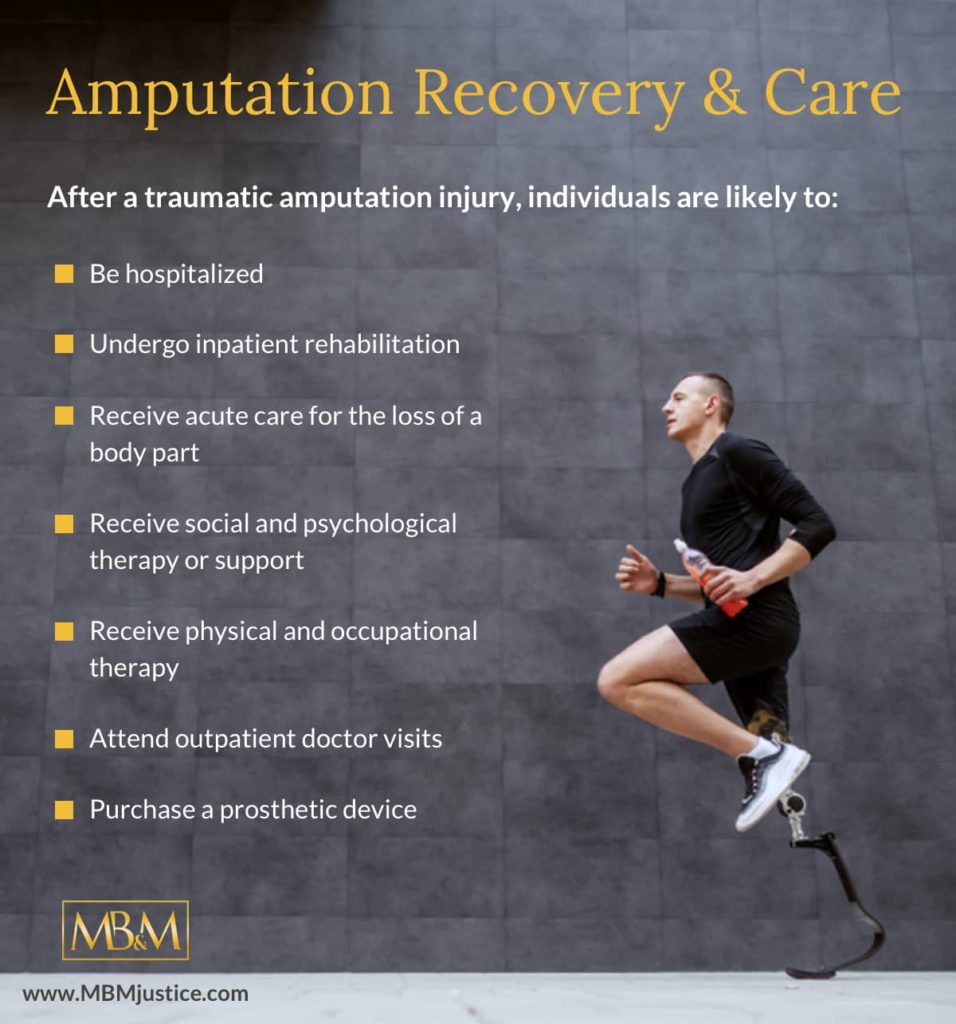
How Much Is My Amputation Injury Case Worth?
Amputation injuries can affect nearly every aspect of your life, causing severe physical, emotional, and financial damages. Because these cases can vary so widely between injury victims, from the loss of a finger to the total loss of a leg or arm, the amount of compensation available in your case will depend on the unique circumstances of your injury.
Depending on the details of your case, you may be entitled to recover compensation for:
- Current and future medical treatment
- Ongoing physical and psychological therapy
- Assistive devices, such as prosthetic limbs
- Lost wages
- Diminished earning capacity
- Scarring and disfigurement
- Pain and suffering
Do I Need A Lawyer for My Amputation Injury Case?
If the negligence of someone else caused your amputation injury, you deserve compensation for your damages. In addition to high medical bills, amputation injuries can have a tremendous impact on your ability to work and quality of life. When seeking justice for your losses, it is in your best interest to seek experienced counsel in order to help you achieve the best possible outcome in your case.
The accomplished amputation injury attorneys at Mandell, Boisclair & Mandell, Ltd have extensive experience in handling these difficult cases. This provides you with a distinct advantage in your personal injury lawsuit. When protecting your rights and best interests, our attorneys will:
- Investigate the facts surrounding your injury
- Gather evidence to support your case
- Determine liability for your injury
- Analyze the value of your current and future damages
- Discuss settlement with the insurance company
- Take your case to trial if a fair settlement cannot be achieved
If you’ve lost a limb due to someone’s carelessness or recklessness, your first step toward the justice you deserve starts with a free consultation. Your amputation injury claim will be handled on a contingency basis, meaning you won’t owe us any attorneys’ fees unless we achieve a positive outcome in your case.
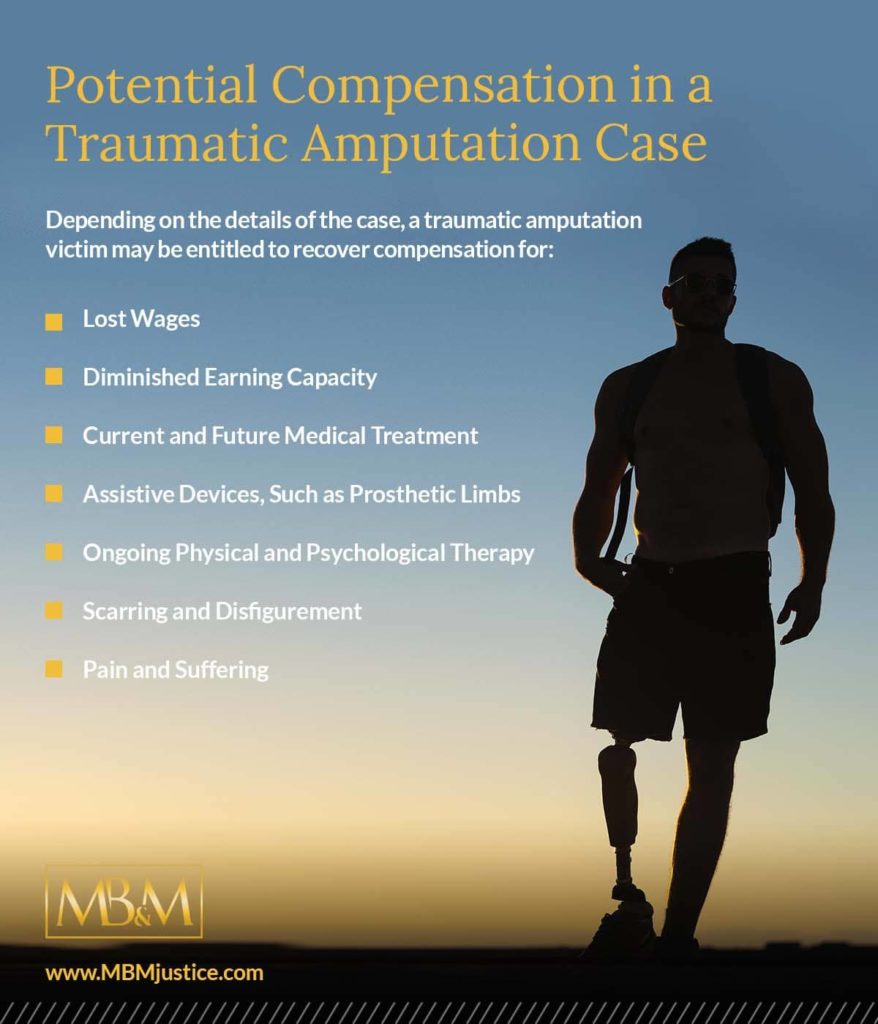
Amputee Resources and Support
Ongoing support is a vital part of the recovery process. Support groups can provide a place for families and individuals who have been affected by limb loss to connect with others who have overcome similar challenges.
Some resources for individuals who have lost a limb, extremity, or body part in a traumatic amputation injury include:
- The Amputee Coalition helps those impacted by the loss of a limb through education and advocacy to help them enjoy a high quality of life.
- Limbs for Life Foundation is a global nonprofit organization that helps to provide prosthetic care for those who have lost a limb.
- Moved United offers sports rehabilitation programs to those with permanent physical disabilities. Activities include fitness and special sports events, summer and winter competitions, winter skiing, and water sports.
In Rhode Island, when you are injured at work, the first course of action is typically a workers’ compensation claim. Rhode Island law mandates employers carry workers’ compensation insurance to cover the medical expenses, lost wages, and rehabilitation costs of injured workers, no matter who is at fault for the accident. Rhode Island workers’ comp laws specify what an injured worker may recover.
If someone other than your employer was responsible for your injury, you may be entitled to file a third-party claim. With these claims, victims can seek compensation beyond medical expenses and lost wages, addressing issues, including pain and suffering. Having an amputation lawyer on your side for these proceedings is very important.
The Providence amputation lawyers at Mandell, Boisclair & Mandell understand the personal injury process. When you come to us for assistance, we will carefully review your claim, assess your options, and help you understand your rights so that you can make the most appropriate decision for your situation.
Proving negligence in an amputation injury case requires establishing four key elements:
- Duty of Care. The first step is proving that the defendant had a legal obligation to ensure your safety.
- Breach of Duty. Once the duty of care is established, it must be shown that the defendant breached this duty.
- Causation. After it has been established that the duty of care was breached, it must be proven that the defendant’s actions caused the injury.
- Damages. Finally, it must be demonstrated that you suffered actual, measurable damages as a result of the injury.
To establish these things, it is often necessary to conduct a thorough investigation into the accident. This is a complex process that involves reviewing medical records, accident reports, photos and videos, and other physical evidence. It may also involve interviewing witnesses and securing expert testimony from medical professionals, engineers, accident reconstruction professionals, and others who can provide insight into the causes of the accident.
Your amputation injury attorney will play a direct role in collecting and organizing evidence to build a strong case for compensation. Having experienced legal representation helps to ensure your accident is thoroughly evaluated and all liable parties are identified. At Mandell, Boisclair & Mandell, our lawyers have nearly five decades of experience helping victims of traumatic injury seek justice. During your free and confidential case evaluation, we can discuss the investigative process in greater detail to help you understand what may be required to prove liability in your case.
You may still be able to file an amputation injury claim if you played a role in your accident. Rhode Island follows a pure comparative negligence rule, which means that your compensation will be reduced by the percentage of fault attributable to you, regardless of the level of your responsibility. Even if you are found to be more than 50% responsible for an accident, you may still recover damages, though the amount will be reduced in proportion to your degree of fault. For example, if you are found to be 30% at fault, your compensation will be reduced by 30%, if you are 70% at fault, your compensation will be reduced by 70%, and so on.
Determining fault in an accident is seldom a straightforward task. During our investigation, we will thoroughly review all evidence to determine how your accident occurred, enabling us to identify all liable parties and helping to ensure you are not blamed for an outsized role.
Three types of compensation may be sought through a personal injury claim, though only two of them are common. These are:
- Economic damages such as medical bills, lost wages, and other tangible expenses/losses.
- Non-economic damages such as physical pain and suffering, bodily injury, distress, scarring, and similarly intangible concerns.
In some cases, it may also be appropriate to seek punitive damages, which serve to punish particularly egregious or reckless behavior. While punitive damages may be awarded to victims in cases involving intentional, reckless, or wanton negligence, they can only be awarded by the court—not through settlement negotiations.
The timeline for resolving an amputation injury case can vary significantly depending on the complexity of the case, the willingness of the opposing party to settle, and whether the case goes to trial. Factors such as the extent of your injuries, the amount of damages sought, and the negotiation process will all play a role in determining how long your case will take as well. Some cases may be settled within a few months. Others can take one or more years.
When a settlement can be reached through negotiations, compensation may come more swiftly. Settlements also avoid the complexity and unpredictability of a trial. However, once you have accepted a settlement offer, you will be barred from pursuing additional legal action for the injury.
If your case goes to trial, a jury will determine the outcome. While trials can result in larger verdicts—and are the only way to seek punitive damages in Rhode Island—they come with risks, such as a lengthy legal process and the possibility of losing compensation if the verdict is not in your favor.
When you select an amputation injury lawyer, it is important that you choose someone with proven experience both in and out of the courtroom. The attorneys at Mandell, Boisclair & Mandell have been recognized for their negotiation and litigation accomplishments by Super Lawyers®, Best Lawyers®, and more. Our ability to secure significant verdicts and settlements—along with our exceptional client care and dedication to service—has earned us recognition as one of the Best Law Firms in America. If you have been injured or a loved one has died in an amputation accident, we welcome the opportunity to meet with you, listen to your story, and provide insight into how long your claim may take to resolve.
Contact an Amputation Injury Lawyer in Providence Today
Mandell, Boisclair & Mandell, Ltd is committed to holding negligent parties accountable for their actions. We will fight relentlessly on your behalf to seek the full and fair compensation you deserve.
If you lost a body part because of someone else’s negligence, contact Mandell, Boisclair & Mandell, Ltd today online or at (401) 273-8330 for a free, no-obligation consultation. Our attorneys welcome injury victims from Providence and throughout Rhode Island.
























